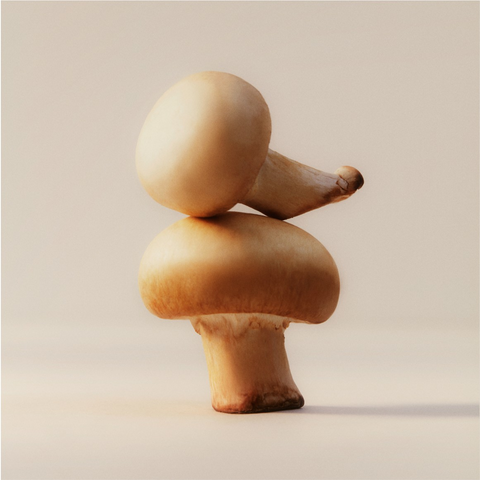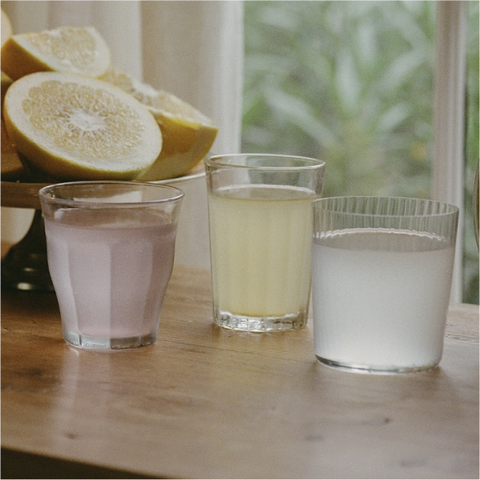Adaptogens have been in use for thousands of years and have deep roots in Traditional Chinese Medicine and Ayurveda. So what exactly are they?
Adaptogens are herbs and medicinal mushrooms that help the body adapt and respond to stress. They work by restoring balance to different systems in the body, like your endocrine, nervous, and immune systems.
By modulating the way your body responds to stress, adaptogens help prime your body to cope with stressors, minimize the impacts of chronic stress, and recover more easily, promoting bodily balance and harmony.
While all types of adaptogens have some effect on modulating your stress response, some are better than others when it comes to providing stress relief and supporting your overall wellbeing. Let’s dig into the best adaptogens for stress.
Do Adaptogens Reduce Stress?
Unlike non-adaptogenic substances, adaptogenic herbs and medicinal mushrooms support the whole body’s ability to cope in the face of stress. They’re also capable of bringing the body back in balance when stress kicks things out of homeostasis.
Stress isn’t just mental. It has real physical effects. When your body goes into stress mode (activating your fight-or-flight response), it releases cortisol, aka the stress hormone. Because cortisol is responsible for putting the brakes on essential bodily functions like digestion and sleep, chronic stress can leave you vulnerable to all sorts of negative health effects like suppressed immune function.
So, how do adaptogens help stress? The process is pretty complex, so experts don’t understand exactly how adaptogens produce the effects they do. But research has told us that they seem to affect the body via the hypothalamic-pituitary-adrenal axis (HPA Axis) and the Sympathoadrenal System (SAS).
Think of the HPA Axis as the major telecommunication center of your body, sending and receiving messages to various bodily systems. It’s also responsible for controlling your stress response.
Adaptogenic herbs for stress work through the communication superhighway in the brain, helping to regulate the stress response and cortisol production. They also help your body recover from stress by way of the adrenal glands and play a role in mitochondrial energy delivery during periods of high stress.
Quick note: even the most readily available adaptogens can produce potent effects. Consider consulting a healthcare professional before adding adaptogenic substances to your routine.
6 Best Adaptogens for Stress
While all adaptogens help adapt and support your body’s stress response, some can produce more targeted results for stress. Learn about the relationship between 6 different adaptogens and stress.
1. Ashwagandha
The adaptogen queen, Ashwagandha, is known for its ability to regulate cortisol and other stress hormones.
More specifically, Ashwagandha Root is thought to support the stress response and stress recovery by promoting a relaxed state of mind and body. There are many other health benefits of Ashwagandha that make it a sought-after adaptogen for overall wellbeing.
2. Reishi Mushroom
Mushrooms have long played a role in the spirituality of many cultures. For some, they even symbolize renewed life.
It makes total sense that they have potent stress-reducing effects. It’s believed that Reishi Mushrooms help the body adapt to stress, while also supporting its immune function. They’re even thought to have positive effects on sleep, which is crucial for coping with day-to-day stress.
One research study found that daily intake of Reishi mushroom powder over an 8-week period helped reduce tiredness in participants with chronic fatigue. Curious how to use Reishi mushroom powder in your daily routine? Enjoy the benefits with our Reishi mushroom tea recipe!
Reishi’s ability to modulate cortisol also helps regulate your fight-or-flight response, encouraging a calm state of mind and body.
3. Rhodiola
This mountain-sourced medicinal plant is an adaptogen that works to reduce physical and biological stress, by targeting mental and physical fatigue, according to research. The less tired you are, the better prepared you’ll be to cope with daily stressors. By improving cognitive function, Rhodiola root can help with mental performance and overall health.
4. Ginseng
Asian and American Ginseng both have adaptogenic properties that can help your body better cope with stress. Evidence suggests that the Asian variety can help modulate cortisol production, helping to regulate the body’s stress response. American Ginseng is no slouch, either. Research shows it may help improve immune health, fortifying your body against stress-causing imbalance.
5. Tulsi
This nutrient-rich adaptogenic herb is high in Vitamins C and A, and minerals Zinc and Calcium — essential nutrients your body needs to support a healthy stress response. Tulsi may also support a healthy metabolism by controlling blood pressure and blood sugar, according to research.
6. Schisandra
This luscious red berry is thought to support the various systems involved in a healthy stress response, including your endocrine, immune, and nervous systems. There’s also evidence that Schisandra supplements can affect your body’s cortisol levels.
Sign Up, Nerd Out
Get wellness tips, education, and recipes
delivered straight to your inbox.
Get wellness tips, education,
and recipes delivered
straight to your inbox.
What is the Best Stress Adaptogen?
The best adaptogen for stress is the one that works for you. Adaptogen effectiveness may vary from person to person, and some may work better for you than others. It may help to experiment with various adaptogenic herbs and medicinal mushrooms to find the best natural remedy for stress relief unique to your needs.
It may also help to combine adaptogens with other stress-relief strategies like exercise, meditation, or journaling. Nourishing your body with adaptogenic supplements can help you build resilience and support a healthy body and mind, no matter what stressors come your way.
Sources
- Ashwagandha. (2023). https://www.nccih.nih.gov/health/ashwagandha
- Asian ginseng. (2020). https://www.nccih.nih.gov/health/asian-ginseng
- Chauhan S, et al. (2022). Effect of standardized root extract of ashwagandha (Withania somnifera) on well‐being and sexual performance in adult males: A randomized controlled trial. https://www.ncbi.nlm.nih.gov/pmc/articles/PMC9297375/
- Cohen MM. (2014). Tulsi - Ocimum sanctum: A herb for all seasons. https://www.ncbi.nlm.nih.gov/pmc/articles/PMC4296439/
- Dongre S, et al. (2015). Efficacy and safety of Ashwagandha (Withania somnifera) root extract in improving sexual function in women: A pilot study. https://www.ncbi.nlm.nih.gov/pmc/articles/PMC4609357/
- Ishaque S, et al. (2012). Rhodiola rosea for physical and mental fatigue: A systematic review. https://bmccomplementmedtherapies.biomedcentral.com/articles/10.1186/1472-6882-12-70
- Jamshidi N, Cohen MM. (2017). The clinical efficacy and safety of Tulsi in humans: A systematic review of the literature. https://doi.org/10.1155/2017/9217567
- Lee S, et al. (2017). Effects of ginseng on stress-related depression, anxiety, and the hypothalamic-pituitary-adrenal axis. https://www.ncbi.nlm.nih.gov/pmc/articles/PMC5628357/
- Li Y, Pham V, Bui M, et al. (2017). Rhodiola rosea L.: An herb with anti-stress, anti-aging, and immunostimulating properties for cancer chemoprevention. https://doi.org/10.1007/s40495-017-0106-1
- Liao LY, He YF, Li L, et al. (2018). A preliminary review of studies on adaptogens: Comparison of their bioactivity in TCM with that of ginseng-like herbs used worldwide. https://doi.org/10.1186/s13020-018-0214-9
- Mancuso C, Santangelo R. (2017). Panax ginseng and Panax quinquefolius: From pharmacology to toxicology. https://www.sciencedirect.com/science/article/pii/S0278691517303915
- Mikulska P, Malinowska M, Ignacyk M, et al. (2023). Ashwagandha (Withania somnifera)—current research on the health-promoting activities: A narrative review. https://doi.org/10.3390/pharmaceutics15041057
- Panossian AG. (2017). Understanding adaptogenic activity: specificity of the pharmacological action of adaptogens and other phytochemicals. https://pubmed.ncbi.nlm.nih.gov/28640972/
- Panossian AG, et al. (2020). Evolution of the adaptogenic concept from traditional use to medical systems: pharmacology of stress- and aging-related diseases. https://onlinelibrary.wiley.com/doi/10.1002/med.21743
- Panossian AG, et al. (2020). Evolution of the adaptogenic concept from traditional use to medical systems: pharmacology of stress- and aging-related diseases. https://onlinelibrary.wiley.com/doi/10.1002/med.21743
- Russian research and uses in medicine. https://www.sciencedirect.com/science/article/abs/pii/S037887410800216X?via%3Dihub
- Salve J, et al. (2019). Adaptogenic and anxiolytic effects of ashwagandha root extract in healthy adults: A double-blind, randomized, placebo-controlled clinical study. https://www.cureus.com/articles/25730-adaptogenic-and-anxiolytic-effects-of-ashwagandha-root-extract-in-healthy-adults-a-double-blind-randomized-placebo-controlled-clinical-study
- Scholey A, et al. (2010). Effects of American ginseng (Panax quinquefolius) on neurocognitive function: An acute randomised, double-blind, placebo-controlled, crossover study. https://www.ncbi.nlm.nih.gov/pmc/articles/PMC2952762/
- Speers AB, et al. (2021). Effects of Withania somnifera (Ashwagandha) on stress and the stress-related neuropsychiatric disorders anxiety, depression, and insomnia. https://www.ncbi.nlm.nih.gov/pmc/articles/PMC8762185/
- Stress. (2022). https://www.nccih.nih.gov/health/stress
- Stress in America 2022. (2022). https://www.apa.org/news/press/releases/stress/2022/concerned-future-inflation
- Tang W, et al. (2005). A randomized, double-blind and placebo-controlled study of Ganoderma lucidum polysaccharide extract in neurasthenia. https://pubmed.ncbi.nlm.nih.gov/15857210/
- Todorova V, et al. (2021). Plant adaptogens—History and future perspectives. https://www.ncbi.nlm.nih.gov/pmc/articles/PMC8398443/
- Xia N, et al. (2016). Schisandra chinensis and Rhodiola rosea exert an anti-stress effect on the HPA axis and reduce hypothalamic c-Fos expression in rats subjected to repeated stress https://www.ncbi.nlm.nih.gov/pmc/articles/PMC4727095/
- Zeng P, Guo Z, Zeng X, et al. Chemical, biochemical, preclinical and clinical studies of Ganoderma lucidum polysaccharide as an approved drug for treating myopathy and other diseases in China. J Cell Mol Med. 2018;22(7):3278-3297. doi:10.1111/jcmm.13613 Understanding the Stress Response. Harvard Health Publishing. Published March 2011. https://www.health.harvard.edu/staying-healthy/understanding-the-stress-response
















